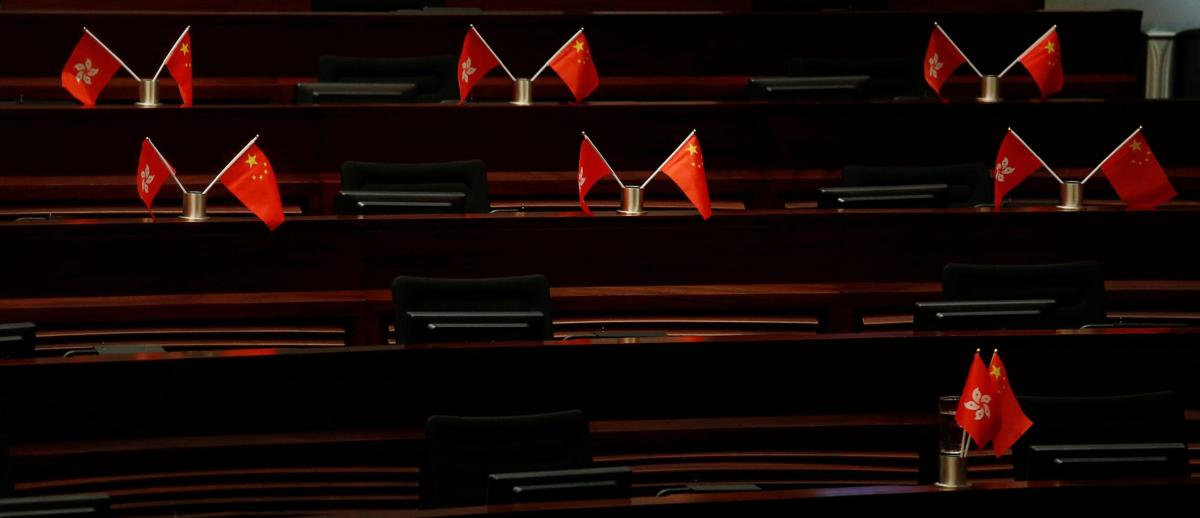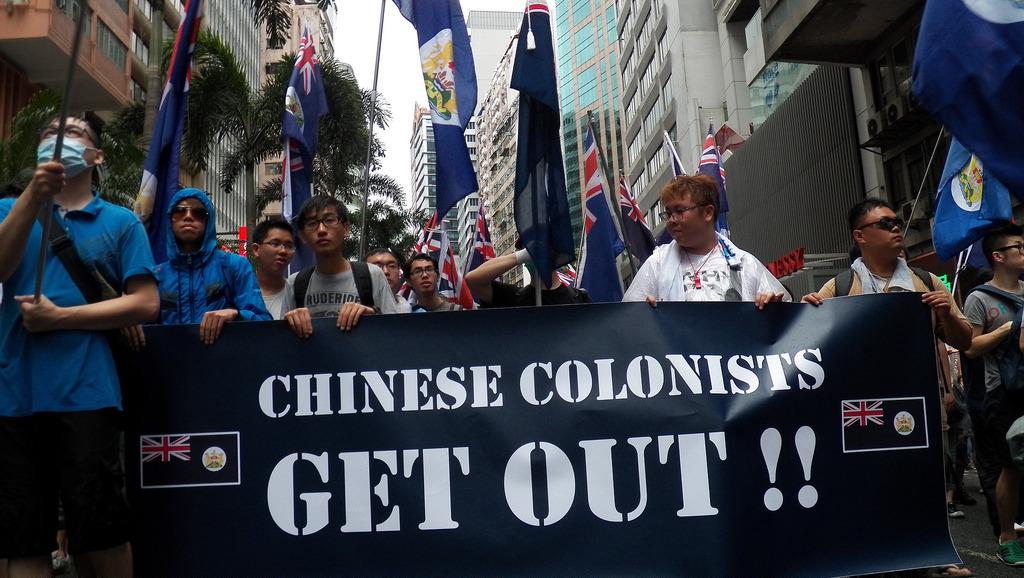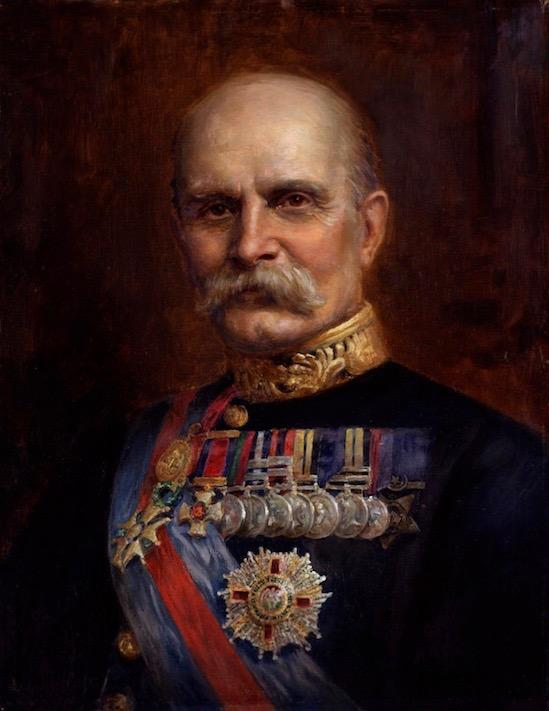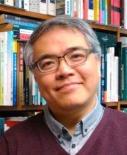Colonial Modernity and The Predicament of Liberalism in Hong Kong
archive


Empty Legislative Council (LegCo) chamber on Oct. 19, 2016 after protest walkout by Pro-Beijing Hong Kong legislators to block swearing in of Youngspiration party members.
Colonial Modernity and The Predicament of Liberalism in Hong Kong
Hong Kong is a city known for its liberalism and openness. The residents of Hong Kong have always been proud of the high degree of freedom they enjoy in many aspects of life; they also regard liberty as an essential part of the modern life that makes this city distinct. However, such a commonsense association of modernity and liberty tends to ignore that fact that most of the liberties Hong Kongers are now used to are in fact by-products of British colonialism, which primarily aimed to develop the city’s reputation as a commercial seaport, and therefore cared more about liberties that ensured the protection of property rights, facilitated commercial exchanges, and strengthened the operation of the free market. Such a colonial system never treated civic liberties as innate rights for all of the residents, let alone the right to a democratic government.1
During the Cold War, Hong Kong furthermore established itself politically as a ‘liberal city’—meaning that it was at the frontline of the ‘liberal camp’ guarding against the communist regime to the North. It was only in the very final years of British rule that democratic elections, albeit for positions with highly limited powers, were to be introduced into the political structure. This political incongruity underlines the contradictory nature of Hong Kong’s colonial modernity—which, however, continues to define the characteristics of Hong Kong even though British colonial power has now already left the scene.
Democratic Hong Kong
The Basic Law, which laid down the principles of the autonomous status of Hong Kong as a ‘special administrative region’ in China (HKSAR), promises a continuation of the city’s ‘existing ways of life’ and the gradual evolution of the political system toward democracy. Despite the fact that not many Hong Kongers seriously think that these rosy promises are redeemable, the pro-democracy movements are still enjoying substantial support—even though it becomes increasingly clear that the only kind of democracy Beijing would allow is one over which it would have full control.
Against the communist regime’s detrimental intrusion into this ‘liberal city’, the democrats have advanced a series of pro-democracy movements and their activism, however difficult, has consolidated a strong sense of local identity around a set of liberal ‘core values’. Alongside the concern for the right to vote, people are increasingly alert to the infringement of basic human rights and concerned about social justice in various areas. They believe that the vitality of this liberal city cannot be maintained if it gives up its cosmopolitan outlook, respect for the rule of law, and culture of inclusive tolerance. These modern values make the people of this city distinguishable from Mainland Chinese. Liberalism has indeed become the most essential element that defines Hong Kongers’ identity.
From time to time, Hong Kong’s liberal-democrats collide with conservatives over a number of key issues such as the relationship between Hong Kong and the central government in Beijing, the form and pace of democratic reforms, and the performance of HKSAR government officials, among others. The two opposing camps have become more polarized over the past decade as Beijing has retreated from its previously tolerant attitude towards Hong Kong’s dissenting voices. At the same time, local conservatives have transformed themselves from Crown loyalists into Chinese nationalists, consolidating their status as a “ruling alliance” by echoing Beijing’s call for patriotism and political loyalty. They argue that the democrats’ adherence to Western ideas of liberty, as witnessed by their doctrinal demand for ‘genuine universal suffrage’, illustrates only the continuation of their colonized mindset and the hegemony of the West. Conservatives portray them merely as leftovers of the old British colonial days without a genuine ‘heartful’ acceptance of Hong Kong’s reunification with China.

Pro-independence protestors carry colonial Hong Kong flags, July 2013
The conservative criticisms have raised a number of interesting questions concerning the relationship between liberalism and colonialism. I think that these criticisms will be adequately dealt with only when the liberals go beyond merely invoking liberalism as moral values, and delve deeper into the entangled and contradictory historical involvement of liberalism in colonialism.
The Liberal-Colonial Legacy
Admittedly, it is perhaps not wrong to say that early liberal thinkers were often apologists for British colonial projects.2 For example, John Locke’s theory of private property served not just as an argument for individual liberty but also as justification for the colonialist appropriation of land inhabited by the indigenous Indians. J.S. Mill defended freedom of speech, yet his theory of progress and development provided an alibi to rationalize the use of tyrannical means against ‘barbaric’ natives. Both Locke and Mill are eminent liberal thinkers whose ideas are influential even nowadays, but they belong to an early phase of British imperialism when the colonialists strongly believed that liberalism provides the foundation for the advancement of human civilization; accordingly, they also treat liberalism as constituting the core of the noble British imperial mission. Yet, they were also very cautious about proclaiming the universality of liberal values. To them, until the barbarians could be colonized and thus transformed by English education into a new social class—“brown in blood and color, white in taste, in morals, and in intellect”3—the ideas of rights or liberties were not applicable to them. The imperial mission should then include reforming native societies, abolishing their traditional practices, and gradually educating them with Western ideas. These colonial practices are shorthanded as Anglicism.
[L]ocal conservatives have transformed themselves from Crown loyalists into Chinese nationalists, consolidating their status as a “ruling alliance” by echoing Beijing’s call for patriotism and political loyalty. They argue that the democrats’ adherence to Western ideas of liberty… illustrates only the continuation of their colonized mindset and the hegemony of the West.
However, the 1857 Indian Mutiny dealt a heavy blow to the British imperialists; through those bloody upheavals they started to realize that their rule in the colonies was highly vulnerable. It was also extremely costly to handle the natives’ revolts, which were often instigated by disgruntled native youths inspired by the ideas of equality and liberty learned in their English classrooms. These crises demanded a reversal of the previous approach toward colonial governance across the whole empire. The British started to recognize the high cost of eradicating native customs and beliefs, and began to coopt ruling partners from among the natives by sustaining traditional authority under colonial supervision. In the name of respecting local cultures, the idealism of spreading superior liberal values gradually gave way to a more ‘pragmatic’ approach.
Hong Kong was ceded to the British in 1842, just 15 years before the Indian Mutiny. In the first few decades of colonial rule, the British displayed no strong will to assimilate Hong Kongers into British culture. Rather, there was a gradual consolidation of what I call elsewhere ‘collaborative colonialism’,4 which relied substantially on the cooptation of Chinese elites. General Federick Lugard, the 14th Governor of Hong Kong (1907-1912), was indeed famous for a clear articulation of the ‘indirect rule’ principle to replace the self-conceited Anglicist doctrines. He redefined the British ‘mandate’ of colonial rule, promising non-interference and even protection of native traditional culture and institutions. Meanwhile, he collaborated with coopted Chinese elites by establishing the University of Hong Kong (HKU), the first in all the British colonies.

Frederick John Dealtry Lugar
In the late-nineteenth and the early twentieth century, criticisms against the detrimental effects of half-baked liberalism arose both in Britain and in the colonies. British colonizers and their native collaborators held liberalism responsible for the moral decline, political chaos, and dissolution of native societies. As a result, the training of colonial cadets was improved with the expansion of anthropological knowledge and fieldwork, which also helped colonial officials enhance their cultural sensitivity. In Hong Kong, we witnessed the savvy deployment of a defunct traditional conservative Confucian culture by the 17th Hong Kong Governor Cecil Clementi (1925-1930), who was also a scholar of Cantonese folklore, in an attempt to stem the spread of cultural and political radicalisms from China to Hong Kong. Clementi’s skillful rule demonstrates vividly how colonialism shifted in the early twentieth century from a mission dedicated to spreading a single superior civilization, towards the business of managing cultures.
‘Traditional’ Colonial Conservatism
Against the backdrop of colonial history, we notice a bizarre but interesting repetition of the critiques against liberalism leveled today by Hong Kong conservatives. Couched now in the rhetoric of ‘decolonization of (the Western-contaminated) mind’, the conservative attack, like its counterpart a century ago, promotes not necessarily a liberation from Western hegemony but rather a transfigured colonial rule. The denial of liberal notions such as ‘universal rights’ mirrors the earlier Anglicist arrogance, and the ways that traditional values are pitted against liberal ideas typically follow similar arguments of Lugard or Clementi.
Couched now in the rhetoric of ‘decolonization of (the Western-contaminated) mind’, the conservative attack, like its counterpart a century ago, promotes not necessarily a liberation from Western hegemony but rather a transfigured colonial rule.
Over the past decade, there has indeed been an upsurge of interest in the idea of ‘empire’ among leading Mainland Chinese intellectuals. It has paved the way for Xi Jinping to refashion the Communist Party as dedicated to the mission of China’s cultural revival, ruling over China with a ‘heavenly mandate’, like the old imperial dynasties did in the past. Hong Kong is then remodeled along this line as a dependent ‘tributary state’ of China. Among Chinese officials in Hong Kong, this trend allows a mixing of strong anti-West/anti-liberal rhetoric with a longing for British colonialist legacies. They even come to mimic Clementi by instructing the loyalists to ‘Try your best to preserve the city’s treasure of British conservatism, taking it as a way to fulfill your own duty of being a Chinese patriot.’5 This advice was offered by none other than the newly appointed Head of the SAR Liaison Office, the highest representative of the Central Government in Hong Kong. Meanwhile, the liberal-democrats are daily smeared by the pro-China newspapers as the dregs and remnant evils of the colonial past.
1. For example, before the 1970s, deportation of political activists, affiliated either with the Chinese Communist Party or the Nationalist Party of China, away from Hong Kong happened from time to time without trial.
2. Mehta, Uday Singh. (2009) Liberalism and Empire. A Study in Nineteenth-Century British Liberal Thought. Chicago: The University of Chicago Press.
3. See Macaulay, Thomas Babington. (1835) Minute on Indian Education. Retrieved April 10, 2018 from http://bit.ly/2GMgKcj
4. Law, Wing Sang. (2009) Collaborative Colonial Power. The Making of the Hong Kong Chinese. Hong Kong: HKU Press.
5. Wang, Zhen Min. (2015, December 2). Shimeshi xianggang de shencengci wenti(什麽是香港的深層次問題). Retrieved April 10, 2018, from http://www.zijing.org/2015/1202/669826.shtml



